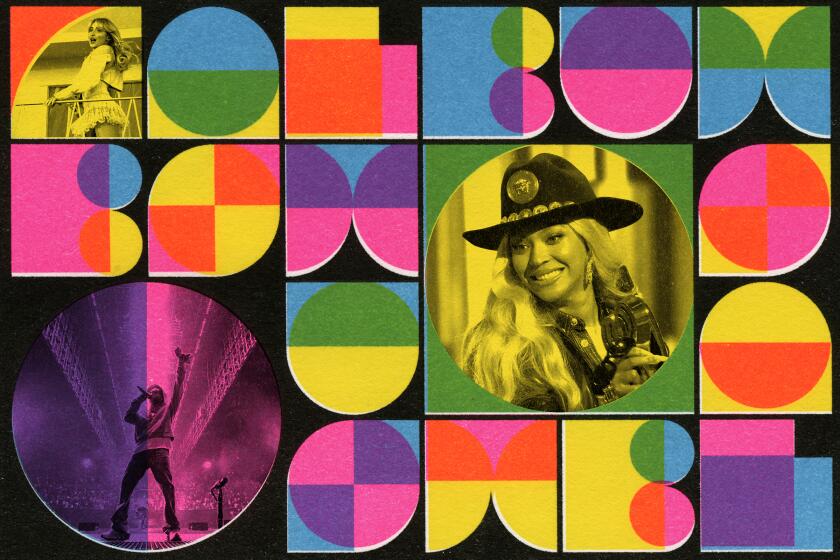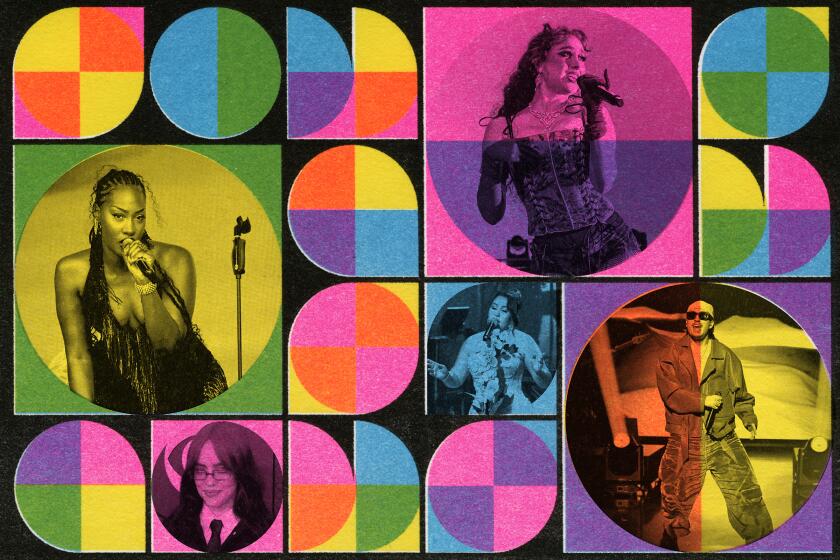Music for the rocker
In the flush of youth, Rod Stewart and Barry Manilow would have laughed to think their careers would ever be linked. Back then -- the early 1970s -- Stewart was a rock kingpin strutting his rooster haircut in the Faces and scoring solo hits including “Maggie May.” Manilow, though a year younger than Stewart, was acting like rock never happened, arranging Andrews Sisters songs for Bette Midler and stepping toward easy-listening superstardom.
Stewart surfed the wave of a counterculture going mainstream; Manilow aimed at a Middle America that viewed rock as a rip in the continuum from Nat King Cole to the Carpenters. But years gone by make friends of former ideological adversaries. Today, Stewart and Manilow are united in rewriting the musical -- and, by extension, cultural -- history of rock.
Their latest releases share much beyond the tinted coifs, bad suit jackets and knowing smiles the singers wear in their cover portraits. Both are selling massively to the one demographic that still prefers albums over ringtones. (Manilow even promoted his on Mom’s home-inside-the-home, the QVC Channel.) Pop tycoon Clive Davis co-produced Manilow’s for Arista, the label he founded in 1974, and Stewart’s for J, his post-Arista gig. Each takes its star into the classic-rock era after big scores with collections of pre-rock standards, and each focuses on ballads: rock’s isolation tank for pre-rock sentimentality. Neither contains a note that could cause uncertainty or discomfort. And both have titles asserting that the music within is “great.”
Stewart and Manilow both have been singled out as enemies of “quality” rock -- the British lad after he moved to California in 1975 and “sold out,” the pop maestro since he had his first hit, 1974’s tear-stained love letter “Mandy.” These new efforts recast the rock era in a light that favors their own values. And they don’t need critical validation -- as “songbooks,” they are canonizing works, passing down an official list that millions of listeners will preserve.
Stewart’s “Still the Same ... Great Rock Classics of Our Time” is the odder duck. Most of its picks are from the mid-1970s -- the time of rock’s gentrification, when suave players such as David Gates of Bread (whose “Everything I Own” Stewart delivers) polished its grit to suit the leisure-suit set. Soft-rock icons the Eagles and Cat Stevens are presented as cut from the same cloth as iconoclasts Bob Dylan and Van Morrison; in fact, Stewart renders poppy efforts by those undisputed greats indistinguishable from the work of their imitators. The result is a portrait of rock that eliminates its more challenging subversions.
This move means to resolve the conflict that’s long haunted Stewart. Originally, Stewart was the voice of the common counterculture, an ordinary kid caught up in social change and trying to sort out its meaning for the working class. Then, detractors say, he got cheap, just another airplay chaser selling sex and romantic cliches. His “Great American Songbook” series resurrected sales this decade by removing him from rock altogether but didn’t solve the problem of his damaged rocker rep.
“Still the Same” attempts to level the hierarchies that led to Stewart’s mixed reputation. Play only the first 10 seconds of each track and you’ll recognize every hit: They’ve been chosen for that earworm quality, their riffs or chord progressions made iconic by repeated airplay. Their moderate tempos and arching melodies follow the most reliable blueprint for pop drama, building steadily, verse by verse, toward a chorus that unifies all of the music’s impulses. Studio greats including guitarist Greg Leisz, bassist Leland Sklar and drummer Kenny Aronoff breathe them into shape.
Gone are the rough edges -- Badfinger leader Pete Ham’s sob of a vocal in “Day After Day,” the hyper tone of Dylan’s “If Not for You.” Those qualities are what rock brought to pop -- the bursting seam of the amateur’s voice as it reached for the stars. Pre-rock pop celebrated individuality but valued the entertainer’s savvy over the maverick’s nerve. Stewart, far from his freaky days but still hoping to maintain his rocker cred, is making a case for considering rock within the value system of pop.
“Still the Same” won’t make many year-end critics’ polls; it’s far too bland and calculated a product. But it’s perfect for a generation reconsidering its own ideals. The counterculture Stewart rode in on seems so distant, given the baby-boomer conservatives running things. In that light, Stewart’s crafty assertion that rock be viewed as part of pop, not something working against it, offers a strange kind of comfort.
Manilow’s take on the ‘60s
Manilow might have done exactly the same thing -- it’s easy to imagine him singing many of the songs Stewart tackled -- but, in fact, he makes a bolder assertion. With “The Greatest Songs of the Sixties,” he allows fans to imagine a pop world almost completely untainted by rock. There’s some reality to his vision: Even during the Summer of Love, the Billboard charts were full of bright, pretty music free of rock’s troubling sexiness and implied (if not outright) violence. It’s that lineage Manilow celebrates.
He even enlists the Association, the choral group whose 1967 hit “Windy” turned hippie femininity into something worthy of a Good Housekeeping seal, for a medley blending that hit with the group’s “Cherish,” from the previous year. The pairing produces a marvelous sonic wreck, a hyper-arranged mishmash that merges a painfully sad song with a demonically perky one, ultimately eliminating coherent feeling altogether.
But then, that’s partly what Manilow is about -- his own songs explode with grandiosity, ending up more expressive of the idea of passion than of any particular feeling. On “Greatest Songs,” he highlights classics that turn feeling into show. Under his flashy hand, what a show it is.
His most brazen move may be reclaiming “Blue Velvet,” a No. 1 single for velvet tux man Bobby Vinton in 1963. Ever since David Lynch released his film of the same name in 1986, that song has symbolized Middle America’s sordid subconscious; it’s difficult to hear it without visualizing the victimized mother, played by Isabella Rossellini, who sang it in the film. But for Manilow, it’s just a song: a vehicle that can be emptied of those associations. This is the pure idea of the pop standard, emphasizing craft and lineage over rock’s zeal and exploratory weirdness.
Manilow finds much personality in pop, though as usual with this consummate showman, it’s hard to know if he’s really feeling it. He mimics Dean Martin, whom he venerates, and pays tribute to his own list of greats: Burt Bacharach and Hal David, Herb Alpert, Dionne Warwick, the Paul half of Lennon/McCartney. His voice is as plebeian as ever, a hearty bellow when the choruses rise and a creature of winks and nudges when the mood is spicy. His primary tone is almost tongue-tied, as if that clear voice can only reach for emotion, not grab its essence.
Manilow’s flat affect works as a sort of democratizing force; like his old friend Karen Carpenter, he turns being facile into facility. The common touch implies that this star could be you.
Rock of the 1960s expressed democracy differently: Its story was one of oddballs encouraging each other to vent. The ongoing success of Manilow and Stewart reminds us that nonconformist ideals aren’t often maintained. It’s easy to be a freak when you’re young and pretty; when things start sagging, one is encouraged to go classic. And apparently that’s true in pop as well as in life.
More to Read
The biggest entertainment stories
Get our big stories about Hollywood, film, television, music, arts, culture and more right in your inbox as soon as they publish.
You may occasionally receive promotional content from the Los Angeles Times.










